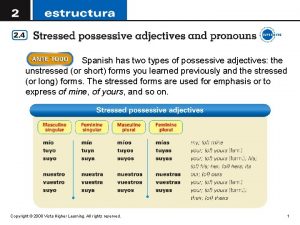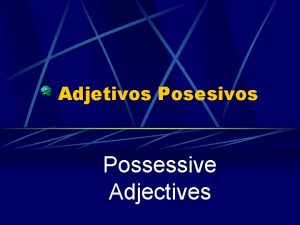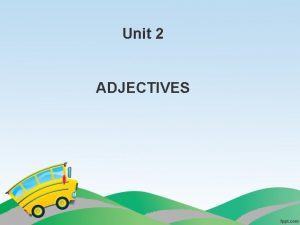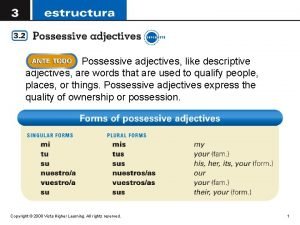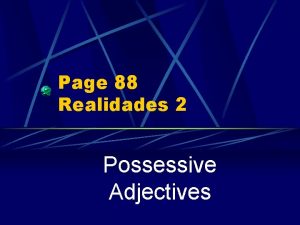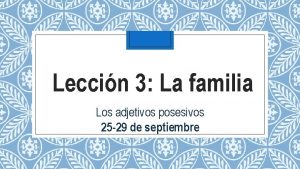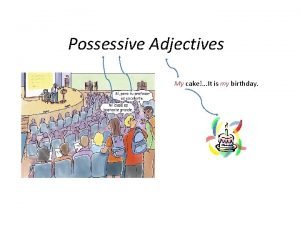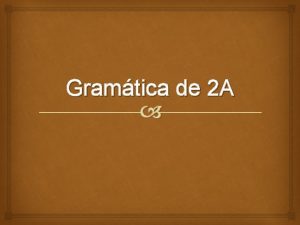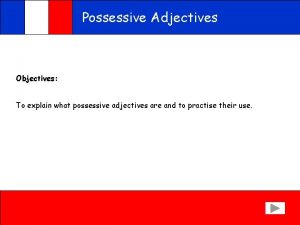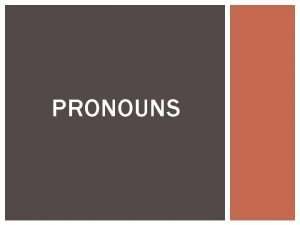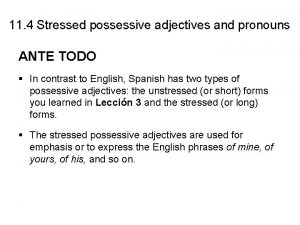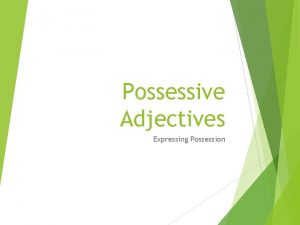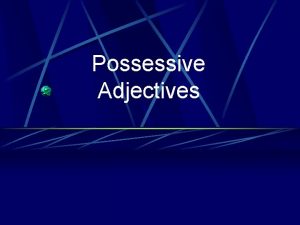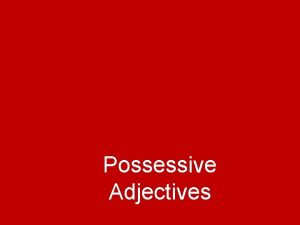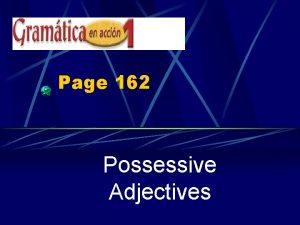Possessive Adjectives La Regla de Posesin n Nunca
















- Slides: 16

+ Possessive Adjectives

+ La Regla de Posesión n Nunca usamos “ ‘s ” n Usamos “de” n Por ejemplo: Mary’s cat n El gato de María n Peter’s dog n El perro de Pablo n n When using “de” we place the noun that is owned, then de, then the person who own’s the noun. n Mom’s desk n El escritorio de Madre

+ Well… We can also use n Possessive Adjectives n Possessive adjectives show ownership or relationships between people. n They are placed before the noun. n They must agree in number and sometimes in gender with the nouns that they describe.

+ Posessive Adjectives singular plural mi / mis (my) nuestro a, os, as (our) tu / tus (your) vuestro, a, os, as (your inf. ) su / sus (his, her) su / sus (their) or (your f. ) or (theirs)

+ In English, the possessive adjectives his, her, and their tell whether something belongs to a male, a female, or more than one person. n In Spanish, the possessive adjective su has many possible meanings (his, her, its, your, their). Context usually makes the meaning clear.

+ Possessive Adjectives The possessive adjective must be singular if the noun (that is owned) is singular and plural if the noun is plural. While possessive adjectives refer to the owner, their form agrees in gender and number with the noun that comes after them.

We use mi, tu, su, or nuestro, that refers to + who is the owner. Then we change those (mi, tu, su, or nuestro depending on what is owned. If more than one thing is owned we add a “s” at the end of the possessive adj.

+ Posessive Adjectives n. Mi prima es alta. n. Todas de mis primas son altas.

+ Su and sus can take the place of a phrase with de + person. n¿De dónde es la madre de Juan? n. Su madre es de Puebla.

+ Nosotros tenemos tres primas n ¿nuestro/ nuestra/ nuestros/nuestras? n. Nuestras primas

+ Ustedes tienen un abuelo n su/ sus/ nuestro/ mi n. Su abuelo

+ Mi familia y yo tenemos una gata. n nuestro/ mi/ tus/ nuestra n Nuestra gata

+ Yo tengo dos hermanos mayores. n mi/ tus/ mis/ tu n Mis hermanos

+ Mis abuelos tienen un perro. n mi/ nuestra/ sus n Su perro

+ Hoy tienes quince años n Es mi/ nuestro/ su/ tu n Tu cumpleaños

 Descriptive and possessive adjectives in spanish
Descriptive and possessive adjectives in spanish Possessive case exemplos frases
Possessive case exemplos frases Posessive adjectives
Posessive adjectives Adjectives
Adjectives Label the body parts with the proper adjective
Label the body parts with the proper adjective (your, fam.) esposo es italiano.
(your, fam.) esposo es italiano. Possessive adjectives (p. 88)
Possessive adjectives (p. 88) Sustantivos posesivos
Sustantivos posesivos Adjectives for cake
Adjectives for cake The possessive adjectives show ownership.
The possessive adjectives show ownership. Possessive adjectives come after a noun
Possessive adjectives come after a noun Possessive adjectives objectives
Possessive adjectives objectives Pronoun
Pronoun Intentalo indica las formas tonicas de estos
Intentalo indica las formas tonicas de estos Spanish posessive pronouns
Spanish posessive pronouns 3a.2 possessive adjectives
3a.2 possessive adjectives Exemplos de possessive pronouns
Exemplos de possessive pronouns
